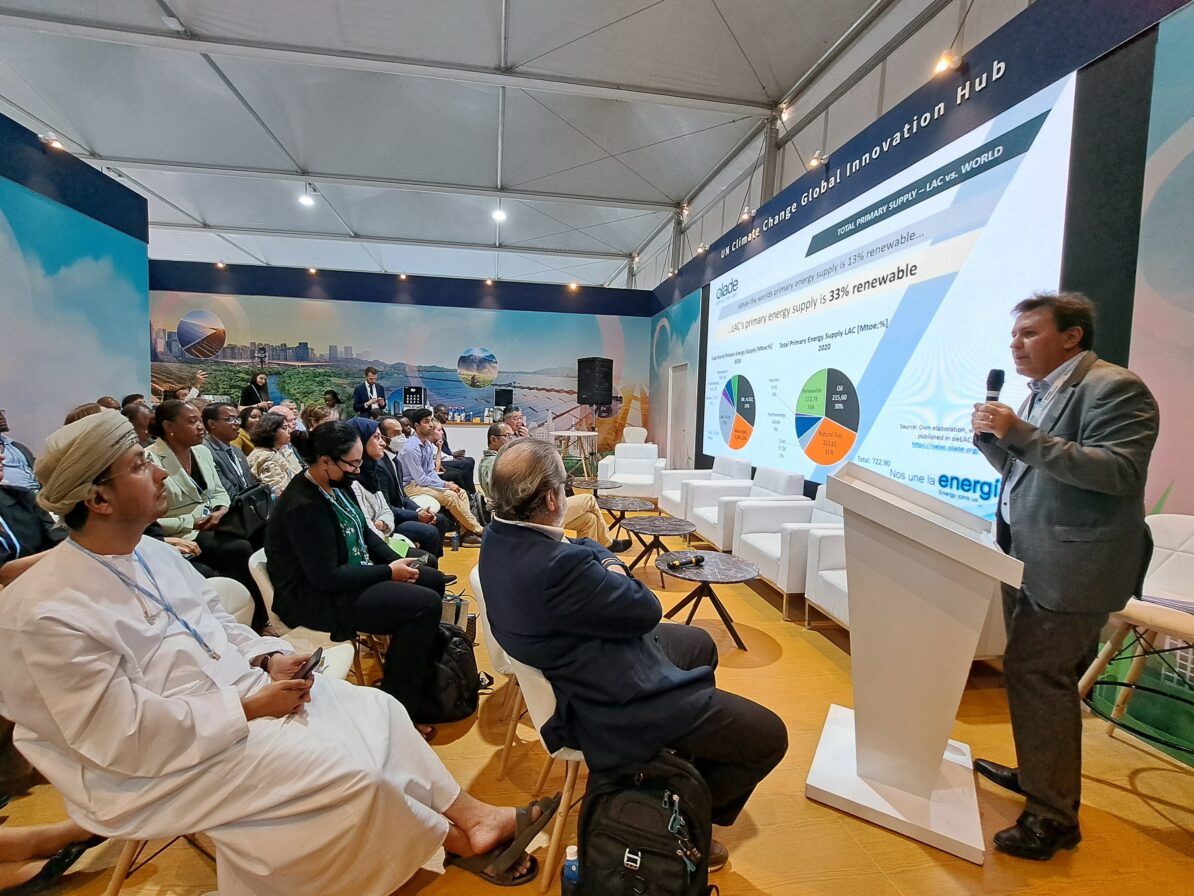Olade was present at several events during the United Nations Climate Change Conference COP27 held in Egypt. Through the presentations of the Executive Secretary, Alfonso Blanco, the advantages of the energy sector in Latin America and the Caribbean were highlighted thanks to its historical commitment to renewability.
There was also a shared regional commitment to make progress in meeting greenhouse gas emission reduction targets. Latin America and the Caribbean is highly vulnerable to the impacts of climate change, despite being the greenest region on the planet, with the highest share of renewable energies, and contributing only 5% to the stock of greenhouse gases in the atmosphere. For this reason, the need for a compensation and transfer mechanism was raised, in which regional efforts in terms of climate are recognized.
Some of the topics discussed were the situation of Latin America and the Caribbean, renewability, green hydrogen, innovation, renewable energy goals, and the water and energy nexus.
The meetings also served to strengthen collaboration ties with leading international agencies.
“In renewable energies, the region is cost effective in its matrix. We are incorporating renewables under market conditions and long-term purchase agreements. That is the “game changer” situation in our regional strategy. Why? Because we have very stable electricity prices compared to the rest of the world due to the fact that we have long-term purchase agreements as a very important component in the electricity market. In that sense, in the midst of the supply crisis in the rest of the world, Latin American markets have not seen the increases that we see in other regions,” said Olade’s executive secretary during his talk at the “Game Changers Accelerating the Global Energy Transition” series during the Energy Action Event of the International Renewable Energy Agency (IRENA).
Renewability, hydrogen and regional challenges
The executive secretary spoke at the opening ceremony of the Green Hydrogen Day at the Global Innovation Hub Pavilion at COP27, which was moderated by Carlos Ruiz-Garvia, project manager for the UNFCCC UN Climate Innovation Center.
“It’s not about turning hydrogen production into a new extractive industry. The strategy in Latin America is to produce hydrogen to create a value chain and a new industry,” he said. Olade’s executive secretary reviewed the different strategies of Latin American countries and ongoing projects.
He also said that to develop renewable energy, the general public must be shown that renewable energies are cost-effective for the electricity system.
He considered that in terms of renewability, the great challenge for Latin America and the Caribbean is to reduce the gap between countries: “We have countries with 100% renewability and others with a very low percentage, mostly concentrated in the Caribbean region. They are very vulnerable to different fossil fuel supply conditions.”
He also addressed the issue of green hydrogen development at the Development Bank of Latin America (CAF) conference “Energy transition for a greener economy in LAC.”
“The region has very good conditions for hydrogen production considering costs and wind and solar resources. The key question is what the markets will be. We have a regional demand but in order to have the scale for the investment needed to be cost-competitive, we need more definition of what the markets will be,” he said.
During this conference there was also an enriching exchange on the situation of renewable energies and energy transitions in Latin America.
Olade’s Executive Secretary also participated in a panel on the nexus between hydropower and new renewable energies, and the opportunities for the global south, organized by GWEC. It dealt with topics such as the complementarity between hydropower and new renewables, and the promotion of energy transitions.
Progress of the RELAC initiative
During COP27, a meeting was held with authorities from the region’s energy ministries and partner agencies of the RELAC initiative. The progress made by this climate action platform – made up of 16 Latin American countries – was presented and proposals were made on how to achieve energy security through energy transitions.
The value of coordinated support for the energy transition agenda was highlighted and Barbados was welcomed as a new member of RELAC and the third from the Caribbean region to join.
